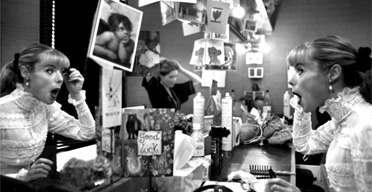
We sometimes forget in August that there is life beyond Edinburgh. Cross the Forth Bridge, take the A9 to the north and you come to the Pitlochry Festival Theatre nestling in the Perthshire hills. En route you pass a sign advertising "the Macbeth Experience". I wondered what this could offer: simulated regicide, perhaps, with a lifetime's remorse? I also couldn't resist a detour to Birnam in the faint hope of seeing the wood come to Dunsinane. When Macbeth was staged (with Joss Ackland) in the first-ever Pitlochry season in 1951, the camouflage branches were actually plucked from Birnam wood.
When you get to Pitlochry itself, you realise why the festival is still going strong. "It's Brigadoon," one actor says, referring to the Lerner and Loewe musical about a fantasy Scottish town.
In 1951 the festival took place in a tent in the grounds of Knockendarroch House, where I lodged. But since 1981 it has occupied a handsome 550-seat theatre on the banks of the Tummel that offers stunning views of the peak of Ben Vrackie from the plate-glass foyer. I can't think of any theatre in Britain more seductively situated.
"Stay six days and see six plays," was the inspired marketing slogan of its early director, Kenneth Ireland. That remains the policy of its current director, Clive Perry, who has run the theatre since 1987 and who retires next year. Eclecticism is clearly the name of Perry's game. The current season, running from May to October, embraces Barrie, Rattigan, Hare, a Scottish version of Molière, The Ladykillers and an adaptation of Rosamunde Pilcher's The Shellseekers. What Pitlochry proves is that theatre can be popular and good: 73% of its income is earned, as opposed to subsidised, but it maintains a 22-strong company and, from what I saw, enjoys an exemplary standard of performance and design.
I stayed two days and saw three plays, and what impressed me most was Richard Baron's revisionist production of David Hare's Amy's View. At the National in 1997, and later at the Aldwych, the play offered a fascinating attack on the greedy individualism of the Thatcherite years, but also a loaded defence of theatre itself against the glib hucksterism of the media. How could you not side with Judi Dench's enduring actress, Esme, in her debates with her daughter's lover, Dominic, who seemed little more than a hustling opportunist?
At Pitlochry, however, the play seems far better balanced. Alice Fraser plays Esme as a jobbing actress rather than a grand star, and as someone who treats even motherhood as one more role to be undertaken. Fraser's adroit mix of feline skittishness and incestuous theatricality also motivates Matthew Chambers's far-from-unsympathetic Dominic and lends a raw emotional power to her confrontations with Amanda Beveridge's Amy. When the latter attacks her mother's calculated charm and claims "you've pretended it's funny to live in a dream", you begin to understand the play's title. Amy's view is that you give love unconditionally to another person; Esme's love seems reserved for the theatre.
Hare's play also offers a vehement assault on the transformation of England into a fantasy theme park populated by lovable eccentrics. But, although Hare presents that as an essentially Thatcherite phenomenon, its roots can be traced back to the Ealing comedies. And the point is ironically confirmed by Pitlochry's staging of Giles Croft's version of The Ladykillers, which is again directed by Richard Baron, stars Alice Fraser as the frisky Mrs Wilberforce and even contains jokes about Pangbourne - Esme's home in Amy's View and the place where the heroine of The Ladykillers first heard of the death of Queen Victoria.
The Pitlochry audience takes The Ladykillers as an amiable romp about a group of self-destructive train-robbers, which on one level it is. But it also strikes me as an endorsement of that English quaintness that Hare's play so persuasively attacks. You can even see it, as Charles Barr brilliantly does in his book Ealing Studios, as a metaphor for post-war British politics. The criminal gang pretending to be a string quintet represents the 1945 Attlee government redistributing wealth under a facade of respectability. Meanwhile, the silver-haired Mrs Wilberforce, whose house they occupy and who eventually ends up with their loot, embodies what Barr calls "the paralysing charisma of the natural governing class". Even though spiritedly acted, not least by Jimmy Chisholm as a natty thug and Ian Grieve as a thick-witted cellist, it is a deeply conservative work that reinforces a certain kind of whimsical Englishness.
To my surprise, I got far more pleasure out of The Shellseekers, adapted from Pilcher's novel by Terence Brady and Charlotte Bingham. Judging by the conversations around me, I seemed to be the only person in the theatre who had not read the book: a massively popular saga-novel about an elderly woman who strives to protect her grandfather's valuable paintings in spite of the efforts of two of her three children to exploit them for personal gain.
On one level, it's a traditional plea for parent power and the sanctity of the past; but it's also an attack, which David Hare would surely endorse, on the rapacity of city slickers. Inevitably, there is too much plot for the stage to encompass; but in Ian Grieve's production Clare Richards is spirited and humane as the heroine Charlotte Fields is memorably grasping as the nastier of her two daughters, while Anneli Harrison as the nice one shows that goodness can also be extremely sexy.
A predominantly elderly matinee audience had a high old time. If I had one too, it may be a comment not just on the play but on the infectious nature of the pleasure principle which permeates the whole Pitlochry festival.
• The Pitlochry festival runs until October 13. Box office: 01796 484626.

